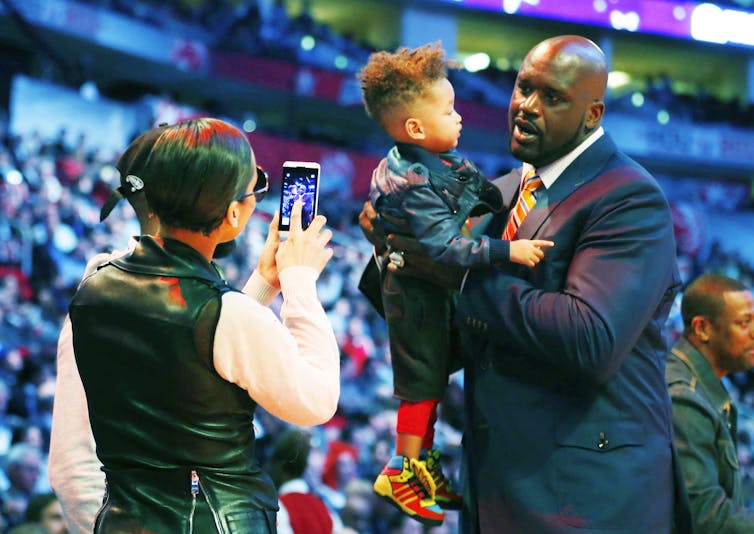Open your Twitter or Instagram account and chances are good somewhere in there you may see an unflattering photo of a stranger. It’s become increasingly common to share pictures of people we don’t know online. With so many social media site, can you sue because of a photo on social media?
And it could happen to you. Imagine, for example, rolling out of bed and heading to the store to pick up a much-needed item. Your hair is unkempt and you’re wearing last night’s pajamas, but you’re unconcerned because certainly no one will notice you. Unbeknownst to you, someone you don’t know takes your photo and posts it on social media, perhaps including cruel language or tagging an account like She Has Had It or People of Walmart which feature and mock unappealing pictures of strangers.
RELATED: This Is How Much Time The Average Millionaire Spends On Social Media
Hundreds of people like, share and comment on this photo of you – do you have any legal recourse against anyone? Having taught and researched Internet law, I believe the evolving online legal landscape may answer yes.
Lawsuits about these kinds of photos tend to turn on a person’s right of publicity, which limits the commercial use of one’s name, image, likeness and/or identity. The outcome of current cases could rein in this common posting practice.

An online Shaq attack
In April 2014, sports commentator and former star athlete Shaquille O’Neal posted a Photoshopped image on his Twitter and Instagram accounts of himself side-by-side with Jahmel Binion. He captioned the picture “SMILE PEOPLE.”
Binion, who was 23 years old at the time, suffers from ectodermal dysplasia, which has left him with a disfigured appearance. In the photo, O’Neal contorted his facial features in an attempt to make a face similar to Binion’s. The social media post received more than 17,000 “likes” and more than 700 comments (many of which were rude or offensive) on Twitter alone.
Based on this activity, Binion sued O’Neal in a Florida federal court for, among other things, something called “appropriation,” which is essentially a right of publicity claim. The basic idea is that you can stop others from using your name, likeness or identity for commercial gain. The Florida court recently denied O’Neal’s motion to dismiss the claim, which means that Binion can continue with the case against O’Neal.
Right of publicity, in the social media universe
So does this right of publicity protect you from having someone post a harmful image of you on social media?
Because the right of publicity is based on state law, the parameters of the right vary significantly by jurisdiction. Roughly 30 states recognize claims based on the right of publicity through statute, common law or both. Most of these states extend the right of publicity to all people, not just celebrities or other famous individuals.
Though there is a lack of uniformity regarding its application, the most common requirements include a person:
1) using another’s name, identity, likeness or persona without consent in a way that causes harm; and
2) receiving some kind of benefit or advantage based on that use.
In the social media universe, it probably won’t be hard to show that a person is harmed when their image is used without permission, especially where cruel or offensive language is used.
The question of the benefit or advantage obtained, however, will be more difficult to prove and has historically thwarted Internet suits of this kind.

What’s in it for the poster?
With the rapid rise in ubiquity of social media platforms, attorneys have grappled with applying traditional right of publicity law to new frontiers like Facebook, Instagram, Pinterest, Tumblr and Twitter.
Everyone’s still trying to figure out the benefit received from using a stranger’s photo online. In one recent case, Fraley v. Facebook, Inc., Facebook found itself in a right of publicity lawsuit based on its use of the Sponsored Stories advertising feature.
RELATED: It’s Complicated: Why We Can’t Seem To Break Up With Facebook
These are paid ads featuring the names and pictures of Facebook users based on their past Facebook activities and “likes.” Though the suit against Facebook ultimately settled, the right of publicity claims survived – the plaintiffs could show a clear connection between the value of their unauthorized endorsements to their Facebook friends and the benefit Facebook gained by using their photos.
While the commercial advantage may be clear in a case like Fraley, where Facebook received money for their ads with people’s pictures and likes, the Binion scenario is more challenging. O’Neal’s post, though widely shared and liked, did not provide a direct commercial benefit to him. Most states require that the defendant received some commercial or monetary benefit.
Some legal authorities, however, state that the right of publicity is not limited to purely commercial benefits. The victim’s right of publicity claim may survive even if the offending party does not receive money or other benefit.
In fact, in Binion, the court suggested that the fact that O’Neal’s post generated significant social media interest and was widely viewed and shared could meet the benefit standard. All those “likes” and “favorites” are a currency all their own. Social media users, therefore, could be exposed to legal liability for posting pictures of strangers under such a theory.
With no uniform body of law to reference, social media users remain susceptible to right of publicity claims. Individuals and companies who use social media to connect with others must be mindful of such uncharted territory and create social media strategies that mitigate their risk of liability. Otherwise, posting photos – particularly unflattering ones – of strangers will continue to expose users to such risks.![]()
Shontavia Johnson, Associate Professor of Intellectual Property Law, Drake University


